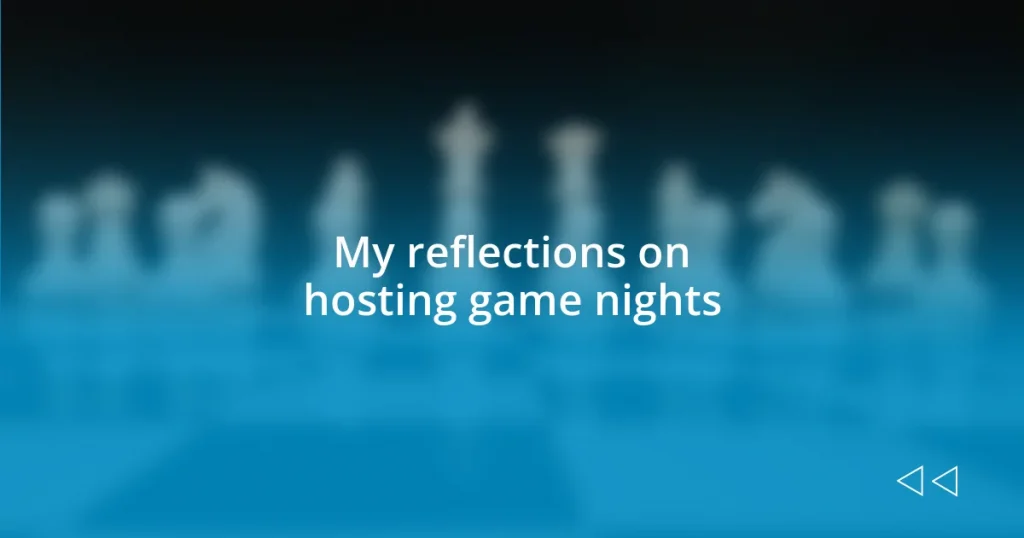Key takeaways:
- Game nights foster connection and unity among friends and family, creating a space for genuine interaction and meaningful conversations.
- Selecting the right games involves considering the group’s dynamics and preferences, ensuring inclusivity and engagement for all guests.
- Establishing a welcoming atmosphere and managing group dynamics are crucial for a successful game night, enhancing everyone’s enjoyment and facilitating conflict resolution.

Importance of Game Nights
Game nights are more than just an entertaining way to spend an evening; they serve as a vital connection point among friends and family. I remember one night when we got so caught up in a very competitive game of Pictionary that the laughter echoed through my entire house. It struck me how those moments foster not just joy, but a sense of belonging and unity.
In a world that often feels rushed and disconnected, hosting game nights creates a cherished space for genuine interaction. When was the last time I truly felt in tune with my friends? It was during a spontaneous trivia night, where the joy of shared knowledge brought us closer, showcasing how the thrill of competition can dispel stress and strengthen bonds.
Moreover, game nights provide a break from our screens, giving us the chance to engage creatively and strategically. I’ve noticed that some of my best ideas emerge during these relaxed settings. Isn’t it interesting how a simple game can spark meaningful conversations about dreams, aspirations, and even vulnerabilities? Every laugh or moment of silence during these nights strengthens our relationships in ways that go beyond the games themselves.

Choosing the Right Games
Choosing the right games for a game night can make all the difference in creating a lively atmosphere. I often think about the dynamics of my group when selecting games; a mix of personalities can lead to a mix of preferences. For instance, I realized that one evening, when I pulled out a strategic board game that normally excites the usual players, my more laid-back friends felt sidelined. It taught me to consider everyone’s tastes to ensure that the night includes something for everyone.
It’s vital to balance complexity and engagement. I remember hosting a night where I introduced a new, intricate card game. While I loved its depth, I noticed my guests becoming frustrated and disengaged. I quickly switched gears to a classic party game that everyone knew, and the energy instantly shifted. This experience reinforced that sometimes the classics are the best choice for a diverse crowd—they’re familiar, easy to learn, and often lead to the most unforgettable moments.
Finally, consider the mood you aim to create. Do you want a laugh-filled, competitive evening, or a relaxed night of camaraderie? I once planned a more serious evening, thinking it would spark engaging dialogue. Instead, it quickly turned into a quiet affair. Learning to adapt the game choice to fit the energy and vibe of the group can truly enhance the night. Listening to everyone’s reactions and adapting is part of the fun too.
| Game Type | Dynamics |
|---|---|
| Party Games | Great for larger groups; encourages laughter and competition. |
| Strategy Games | Engaging for focused players; may alienate those who prefer lighter fare. |
| Casual Games | Easy to learn and friendly; perfect for mixed experience levels. |

Setting the Atmosphere
Creating the right atmosphere for game nights is essential to setting the tone for unforgettable experiences. I often find myself dimming the lights slightly and lighting a few candles, which adds a cozy touch. There’s something about the flickering flames that invites intimacy, encouraging laughter and storytelling. I once hosted a game night where I played some upbeat music in the background, and it turned into a mix of games and impromptu dance breaks. It reminded me how the right atmosphere can transform the evening from merely enjoyable to truly memorable.
To enhance the vibe, consider these elements:
- Lighting: Use soft, warm lighting to create a welcoming space. String lights or candles can work wonders!
- Music: Curate a playlist that matches the energy you want—upbeat tunes can elevate excitement, while softer melodies can foster relaxation.
- Comfort: Ensure there are plenty of cozy seating options and blankets, so everyone feels at ease during play.
- Snacks: Have a selection of finger foods that are easy to munch on—nothing beats popcorn or chips that everyone can share.
- Personal Touches: Incorporate small decorations or themed elements that relate to your games; this adds a layer of fun and engagement.
These components can make all the difference, turning a simple gathering into an event that resonates with warmth and camaraderie.

Inviting the Right Guests
When it comes to inviting the right guests, I’ve found that the personality mix can truly determine the night’s success. I once invited a mix of my competitive friends and those who prefer a low-key vibe. The tension was palpable during the first game, and I sensed that not everyone was having fun. This taught me the importance of considering the emotional dynamics of the group; I’ve learned to aim for inclusivity by understanding who thrives in a competitive atmosphere and who benefits from a more relaxed setting.
I often think about balancing the energy levels too. Think about it—how many times have you had a guest who just didn’t feel comfortable? I remember a game night where I invited a friend who is very shy. At first, they seemed overwhelmed, and I could see their unease grow as the games escalated. So, I made it a point to include a few simpler, collaborative games to encourage involvement. It feels great to see someone who might typically sit back become engaged and cheerful as they find their place in the group.
Moreover, it’s always good to invite those who appreciate the spirit of play, regardless of their skill level. I’ve had evenings where I’ve brought in friends who were new to board gaming, and while they may initially struggle with the rules, their joy in learning was contagious. Isn’t it refreshing to witness the laughter bubble up as new players start to catch on? Inviting the right guests isn’t just about compatibility, but about creating an atmosphere where everyone feels valued and respected, turning a simple game night into a cherished memory.

Planning the Game Night Schedule
When I plan a game night schedule, I often find it helpful to strike a balance between structure and spontaneity. I usually start by determining which games will be on the lineup, considering the time each game will likely require. But, I’ve learned the hard way that allowing for some flexibility helps keep everyone engaged—there’s nothing worse than feeling ‘tied down’ by the clock, right? Once, I scheduled a trivia game that turned into a hilarious debate, and rather than rushing through, we soaked in the laughter together.
Another aspect I consider is the pacing of the night. Mixing high-energy games with slower, strategy-based ones keeps the energy fresh and prevents burnout. For instance, I often alternate between a fast-paced party game and a more thoughtful card game. This approach sparked a memorable evening when everyone was shouting answers in a buzz and then shifted to a calmer strategy session, where we shared personal stories related to the game themes. Isn’t it fascinating how the rhythm of play can shape the conversations that emerge?
Lastly, I take into account the number of breaks needed, especially for snacks and socializing. I’ve noticed that when I don’t schedule these casual moments, the interaction tends to dwindle, and the atmosphere can feel strained. I remember one particular game night where we played for nearly three hours straight, and I could sense everyone getting a bit drained. Since then, I always build in breaks to refuel with snacks and engage in side conversations. It’s those moments of connection that sometimes turn out to be the most enjoyable part of the night!

Managing Game Night Dynamics
One of the key dynamics I’ve noticed in managing game night is establishing a welcoming atmosphere from the outset. I once hosted an event where I intentionally created a cozy space with comfy seating and ambient lighting—just enough to signal that this was a place to unwind and have fun. Have you ever walked into a room and instantly felt at ease? That’s the vibe I aim for, as it instantly lowers any tensions and encourages laughter right from the start.
It’s also crucial to keep an eye on group dynamics during the games. I’ve experienced moments where one overly involved player dominated the conversation, inadvertently sidelining others. I initiated a gentle nudge by asking quieter guests their thoughts, and it transformed the dialogue. It’s so rewarding to watch someone who typically holds back grow animated and share their ideas; isn’t it inspiring how a little encouragement can shift the entire energy of the room?
Moreover, managing conflict is part of the package. I remember one particular game night where a friendly debate escalated into an uncomfortable exchange over a misunderstanding regarding a game rule. Instead of letting it fester, I called for a quick timeout. We took a moment to reset, shared a laugh about the situation, and resumed playing with a renewed sense of camaraderie. It’s these experiences that make you appreciate the resilience of friendships—how a little misstep can lead to even stronger bonds. Who knew that a game night could be a lesson in conflict resolution too?
















